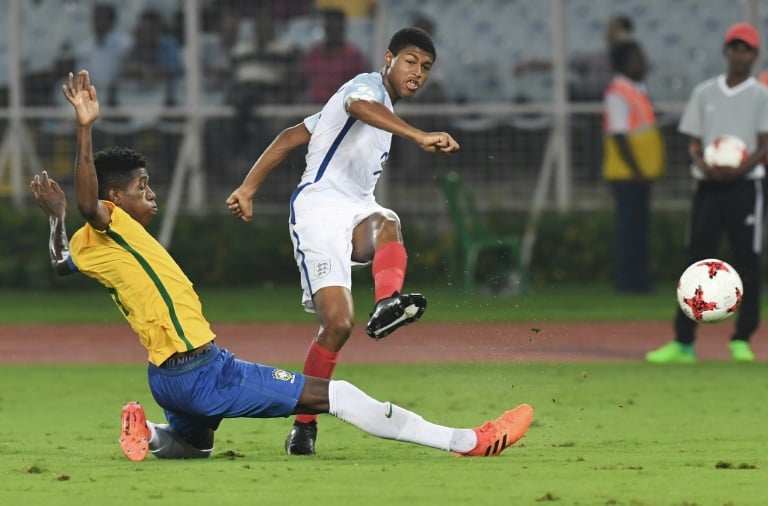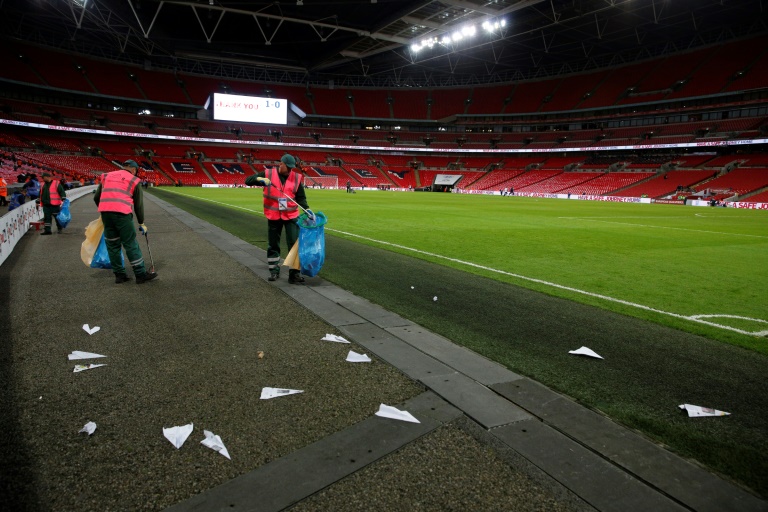Mob justice: Twelve Lenasia residents arrested for allegedly burning and killing four men
England’s starlets enjoyed a 5-2 win over Spain in the under-17 World Cup final in Kolkata on Saturday, capping a remarkable period in which the country’s bright young things dominated on the global stage.
In the past five months, England’s under-17 and under-20 teams have been crowned world champions, while the under-19s won the European Championship.
A mixed-age England squad also successfully defended the prestigious Toulon title in June and the country’s youth teams have lost only twice, both times on penalties, across 34 tournament matches.
That successful streak is a stark contrast to the drab performances of Gareth Southgate’s senior side en route to next year’s World Cup in Russia.

Liverpool’s Rhian Brewster scored eight times in the under-17 World Cup for England
Bored fans even threw paper aeroplanes onto the pitch throughout a tedious qualification-sealing win against Slovenia that offered little hope England can improve on their wretched major tournament record.
Consigned to a humiliating Euro 2016 exit by minnows Iceland and bundled out of the 2014 World Cup at the group stage, England haven’t made it to the semi-finals of a tournament since Euro 96 and their only trophy remains the 1966 World Cup.
Those years of failure makes the rise of England’s kids an alluring prospect.
But the question remains whether they can turn tantalising potential into sustainable success, first with their Premier League clubs and then on the international stage.
Chelsea provided 19 players, more than any other club, for England’s youth movement and Blues boss Antonio Conte is confident the progress will be maintained.
– Patience –

‘Man of the Tournament’, England’s midfielder Phil Foden (R); ‘Highest Scorer’, England’s forward Rhin Brewster (L) and ‘Best Goalkeeper’, Brazil’s Gabriel Brazao, pose with their trophies at he end of FIFA U-17 World Cup, in Kolkata, on October 28
“I think football in England is growing in an incredible way,” Conte said.
“The under-19s won, the under-20s have won and the under-21s also played a really good European Championship. It means England is improving a lot.
“I am sure in the future it will be very difficult to beat the England national team.”
Despite Conte’s optimism, it is hard for some to believe the Premier League’s top clubs, who so often spend huge sums on overseas players in their quest for instant success, will have the patience to allow their youngsters to develop.
Howard Wilkinson, the Football Association’s former technical director, preaches caution about the path to first-team fame.
“That’s something that has to be worked on. We used to be a finishing school for players. It would be a shame if these players have to go to the continent to get their chance,” he said.

Bored fans threw paper aeroplanes onto the pitch throughout a tedious qualification-sealing win against Slovenia that offered little hope England can improve on their wretched major tournament record, at Wembley Stadium in London, on October 5, 2017
Liverpool’s Rhian Brewster scored eight times in the under-17 World Cup, while Manchester City’s Phil Foden netted twice against Spain and was voted player of the tournament.
Back at their clubs, Brewster and Foden won’t find it easy to break into teams loaded with attacking talent.
But City boss Pep Guardiola offers hope, saying: “Phil has been with us since the beginning of the season and played unbelievable against Manchester United and Real Madrid.
“He trains with us every single day. He’s just 17 but he is a player in our squad.”
Some critics claim young English players are too pampered by their clubs, and a coterie of agents and hangers-on, to focus sufficiently on honing their trade.
But England under-17 boss Steve Cooper insists the current success story has shot down that theory.
“The young players we are bringing into our teams are a credit to their generation,” he said.
“Sometimes they get a bit of a tough stick, too-much too-soon and things like that. If you see how they train, how hard they work, they show so much respect.”
Download our app and read this and other great stories on the move. Available for Android and iOS.